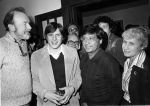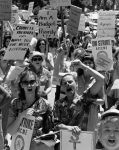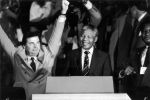Blogs
Collection Spotlight: African-American Labor Oral Histories
In late 1967 Herbert Hill, labor director for the NAACP, traveled to the campus of Wayne State University in Detroit to conduct a series of oral histories with African American men and women that centered around their experiences in the labor movement. read more »
In Memoriam: Pete Seeger, 1919-2014
The folksinger and activist Pete Seeger died Monday, January 27, 2014 at the age of 94, bringing to an end a career that lasted from the Great Depression to the twenty-first century. His lifelong engagement with culture and politics, and his deep commitment to the labor movement, brought him into continual contact with the rank and file of unionized American workers. In 1939, when Seeger was 20 years old, he worked in the Library of Congress Archive of American Folk Song as an assistant to the musicologist Alan Lomax, and it seems fitting that this onetime archivist is so well represented in the archives and manuscripts of the Reuther Library of Labor and Urban Affairs. No fewer than twelve collections in the Reuther Library collections include correspondence, recordings, or other first-hand evidence of his career. read more »
Pay Equity and the Public Employee
The Equal Pay Act of 1963 required that women be paid the same amount as men when performing the same work. This milestone, however, did not go far enough in protecting women from wage discrimination. This 1963 law promoted equal pay for equal work, but beginning in the 1970s, advocates for women’s rights waged a series of legislative and collective bargaining battles to provide equal pay for comparable work as well. read more »
2013: The Digital Year in Review
At the start of 2014, the Walter P. Reuther Library of Labor and Urban Affairs would like to take a moment to remember the year that's just ended and revisit the content that was added to our website in 2013. It was a banner year for the Reuther's blog, with more visits, visitors, and pageviews than in any previous year. read more »




